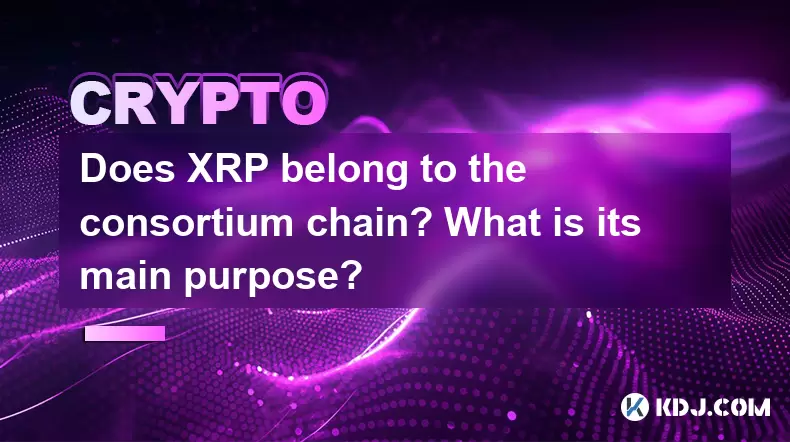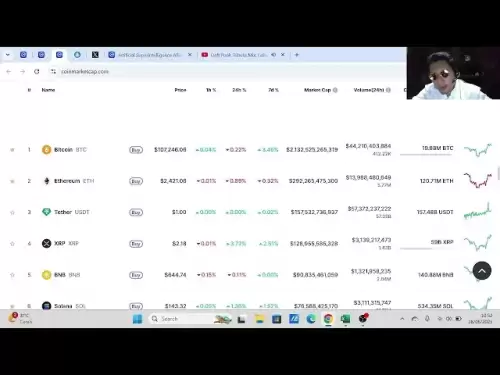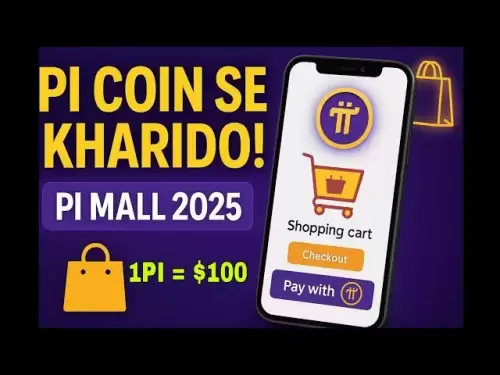-
 Bitcoin
Bitcoin $107,360.0175
0.36% -
 Ethereum
Ethereum $2,425.2303
-1.15% -
 Tether USDt
Tether USDt $1.0003
-0.01% -
 XRP
XRP $2.1850
4.33% -
 BNB
BNB $646.4128
0.37% -
 Solana
Solana $146.0511
2.89% -
 USDC
USDC $0.9998
-0.01% -
 TRON
TRON $0.2754
1.55% -
 Dogecoin
Dogecoin $0.1626
0.80% -
 Cardano
Cardano $0.5599
0.49% -
 Hyperliquid
Hyperliquid $37.2026
0.62% -
 Bitcoin Cash
Bitcoin Cash $499.0346
0.17% -
 Sui
Sui $2.7251
2.86% -
 Chainlink
Chainlink $13.1187
-0.19% -
 UNUS SED LEO
UNUS SED LEO $9.0747
0.54% -
 Avalanche
Avalanche $17.6526
0.87% -
 Stellar
Stellar $0.2373
1.02% -
 Toncoin
Toncoin $2.8387
0.25% -
 Shiba Inu
Shiba Inu $0.0...01136
1.04% -
 Litecoin
Litecoin $85.2460
1.04% -
 Hedera
Hedera $0.1473
2.04% -
 Monero
Monero $314.3978
1.56% -
 Bitget Token
Bitget Token $4.6799
0.81% -
 Dai
Dai $1.0001
0.02% -
 Polkadot
Polkadot $3.3403
0.70% -
 Ethena USDe
Ethena USDe $1.0002
0.02% -
 Uniswap
Uniswap $6.9908
0.77% -
 Pi
Pi $0.5310
-3.57% -
 Pepe
Pepe $0.0...09292
-0.19% -
 Aave
Aave $254.8721
-2.23%
Does XRP belong to the consortium chain? What is its main purpose?
XRP, created by Ripple Labs, facilitates fast, low-cost international money transfers using the decentralized XRP Ledger, not a consortium chain.
May 12, 2025 at 02:28 pm

Introduction to XRP and Its Classification
XRP is a cryptocurrency created by Ripple Labs Inc. It is designed to facilitate fast and low-cost international money transfers. One of the key questions often asked about XRP is whether it belongs to the consortium chain category. Understanding the nature of XRP and its underlying technology, the XRP Ledger, is crucial in answering this question.
What is a Consortium Chain?
A consortium chain is a type of blockchain where the consensus process is controlled by a pre-selected set of nodes. This contrasts with public blockchains, where anyone can participate in the consensus process, and private blockchains, which are controlled by a single entity. Consortium chains are often used in industries where multiple organizations need to share data or processes but want to maintain a level of control and privacy.
XRP Ledger: A Closer Look
The XRP Ledger is the underlying technology that powers XRP. It is an open-source, decentralized cryptographic ledger that is designed to be a more efficient alternative to traditional banking systems. The XRP Ledger uses a consensus protocol known as the Ripple Protocol consensus algorithm (RPCA), which is distinct from the proof-of-work or proof-of-stake mechanisms used in many other cryptocurrencies.
Is XRP a Consortium Chain?
To determine if XRP belongs to the consortium chain category, it's important to examine the structure and governance of the XRP Ledger. The XRP Ledger is not controlled by a consortium of organizations. Instead, it is maintained by a network of independent servers that run the XRP Ledger software. These servers are operated by various entities, including Ripple Labs and other third parties.
While Ripple Labs played a significant role in the development of the XRP Ledger, it does not have unilateral control over the network. The consensus process in the XRP Ledger is decentralized, with validators chosen based on their performance and trustworthiness rather than being pre-selected by a consortium.
Main Purpose of XRP
The primary purpose of XRP is to serve as a bridge currency for international money transfers. XRP aims to enable financial institutions to process cross-border payments more quickly and at a lower cost than traditional methods. By using XRP as an intermediary currency, banks can convert one fiat currency to XRP and then to another fiat currency, bypassing the need for multiple correspondent banks and reducing the time and cost associated with these transactions.
How XRP Facilitates International Payments
XRP's role in international payments is facilitated by its design features. The XRP Ledger can process transactions in 3-5 seconds, which is significantly faster than traditional banking systems. Additionally, the transaction fees on the XRP Ledger are extremely low, typically costing a fraction of a cent per transaction.
- To use XRP for international payments, a financial institution would typically follow these steps:
- Convert the sender's local currency to XRP.
- Transfer the XRP to the recipient's bank.
- Convert the XRP back to the recipient's local currency.
This process can be executed through Ripple's payment solutions, such as RippleNet, which integrates with the XRP Ledger to facilitate these transactions.
XRP's Role in Liquidity Provision
Another important aspect of XRP's main purpose is its role in providing liquidity. In traditional banking, liquidity is often a challenge in cross-border payments, as banks need to hold reserves in multiple currencies. XRP can serve as a common liquidity pool, allowing banks to hold XRP instead of multiple currencies, thereby simplifying their liquidity management.
XRP's Use Cases Beyond Banking
While the primary focus of XRP is on facilitating international payments, it has potential use cases beyond the banking sector. For example, XRP can be used in remittance services, where individuals send money across borders. Additionally, XRP can be integrated into various financial applications and services that require fast and low-cost transactions.
XRP's Market Position and Adoption
XRP has gained significant attention in the cryptocurrency market, partly due to its association with Ripple Labs and its focus on solving real-world financial problems. Several financial institutions have partnered with Ripple to explore the use of XRP in their payment systems. These partnerships highlight the growing interest in XRP as a solution for cross-border payments.
Frequently Asked Questions
Q: Can individuals use XRP for personal transactions?
A: Yes, individuals can use XRP for personal transactions. They can buy XRP on cryptocurrency exchanges and use it to send money to others. However, the primary focus of XRP is on facilitating institutional payments.
Q: How does XRP compare to other cryptocurrencies like Bitcoin and Ethereum?
A: XRP differs from Bitcoin and Ethereum in several ways. Unlike Bitcoin, which uses proof-of-work and can take up to an hour to confirm transactions, XRP uses a consensus protocol and can confirm transactions in seconds. Compared to Ethereum, which is primarily used for smart contracts and decentralized applications, XRP focuses on facilitating fast and low-cost payments.
Q: Is XRP regulated, and what are the legal considerations for using it?
A: The regulatory status of XRP varies by jurisdiction. In some countries, XRP is treated as a cryptocurrency and is subject to the same regulations as other digital assets. In others, there may be specific regulations or restrictions on its use. It's important for users to understand the legal framework in their region before using XRP.
Q: What are the risks associated with using XRP?
A: Like any cryptocurrency, using XRP comes with risks. These include market volatility, potential regulatory changes, and the risk of technical issues with the XRP Ledger. Users should be aware of these risks and consider them when deciding to use XRP for transactions.
Disclaimer:info@kdj.com
The information provided is not trading advice. kdj.com does not assume any responsibility for any investments made based on the information provided in this article. Cryptocurrencies are highly volatile and it is highly recommended that you invest with caution after thorough research!
If you believe that the content used on this website infringes your copyright, please contact us immediately (info@kdj.com) and we will delete it promptly.
- Across Crypto Project Faces Heat: Secret $23M Transfer Sparks Governance Debate
- 2025-06-28 16:30:13
- Trump Coin's Wild Ride: Liquidity Drain, Exchange Deposits, and What It Means for Binance & OKX
- 2025-06-28 16:50:13
- Trump, Memecoin Mania, and Whale Watching: A New York Minute in Crypto
- 2025-06-28 16:30:13
- Shiba Inu, Lending Coins, and Early Holders: A New Frontier
- 2025-06-28 16:51:59
- Meme Coins in July 2025: Investing in the Future of Hype?
- 2025-06-28 16:51:59
- SUI's Trending Surge: Decoding the Reasons Behind the Hype
- 2025-06-28 16:55:12
Related knowledge

How to customize USDT TRC20 mining fees? Flexible adjustment tutorial
Jun 13,2025 at 01:42am
Understanding USDT TRC20 Mining FeesMining fees on the TRON (TRC20) network are essential for processing transactions. Unlike Bitcoin or Ethereum, where miners directly validate transactions, TRON uses a delegated proof-of-stake (DPoS) mechanism. However, users still need to pay bandwidth and energy fees, which are collectively referred to as 'mining fe...

USDT TRC20 transaction is stuck? Solution summary
Jun 14,2025 at 11:15pm
Understanding USDT TRC20 TransactionsWhen users mention that a USDT TRC20 transaction is stuck, they typically refer to a situation where the transfer of Tether (USDT) on the TRON blockchain has not been confirmed for an extended period. This issue may arise due to various reasons such as network congestion, insufficient transaction fees, or wallet-rela...

How to cancel USDT TRC20 unconfirmed transactions? Operation guide
Jun 13,2025 at 11:01pm
Understanding USDT TRC20 Unconfirmed TransactionsWhen dealing with USDT TRC20 transactions, it’s crucial to understand what an unconfirmed transaction means. An unconfirmed transaction is one that has been broadcasted to the blockchain network but hasn’t yet been included in a block. This typically occurs due to low transaction fees or network congestio...

How to check USDT TRC20 balance? Introduction to multiple query methods
Jun 21,2025 at 02:42am
Understanding USDT TRC20 and Its ImportanceUSDT (Tether) is one of the most widely used stablecoins in the cryptocurrency market. It exists on multiple blockchain networks, including TRC20, which operates on the Tron (TRX) network. Checking your USDT TRC20 balance accurately is crucial for users who hold or transact with this asset. Whether you're sendi...

What to do if USDT TRC20 transfers are congested? Speed up trading skills
Jun 13,2025 at 09:56am
Understanding USDT TRC20 Transfer CongestionWhen transferring USDT TRC20, users may occasionally experience delays or congestion. This typically occurs due to network overload on the TRON blockchain, which hosts the TRC20 version of Tether. Unlike the ERC20 variant (which runs on Ethereum), TRC20 transactions are generally faster and cheaper, but during...

The relationship between USDT TRC20 and TRON chain: technical background analysis
Jun 12,2025 at 01:28pm
What is USDT TRC20?USDT TRC20 refers to the Tether (USDT) token issued on the TRON blockchain using the TRC-20 standard. Unlike the more commonly known ERC-20 version of USDT (which runs on Ethereum), the TRC-20 variant leverages the TRON network's infrastructure for faster and cheaper transactions. The emergence of this version came as part of Tether’s...

How to customize USDT TRC20 mining fees? Flexible adjustment tutorial
Jun 13,2025 at 01:42am
Understanding USDT TRC20 Mining FeesMining fees on the TRON (TRC20) network are essential for processing transactions. Unlike Bitcoin or Ethereum, where miners directly validate transactions, TRON uses a delegated proof-of-stake (DPoS) mechanism. However, users still need to pay bandwidth and energy fees, which are collectively referred to as 'mining fe...

USDT TRC20 transaction is stuck? Solution summary
Jun 14,2025 at 11:15pm
Understanding USDT TRC20 TransactionsWhen users mention that a USDT TRC20 transaction is stuck, they typically refer to a situation where the transfer of Tether (USDT) on the TRON blockchain has not been confirmed for an extended period. This issue may arise due to various reasons such as network congestion, insufficient transaction fees, or wallet-rela...

How to cancel USDT TRC20 unconfirmed transactions? Operation guide
Jun 13,2025 at 11:01pm
Understanding USDT TRC20 Unconfirmed TransactionsWhen dealing with USDT TRC20 transactions, it’s crucial to understand what an unconfirmed transaction means. An unconfirmed transaction is one that has been broadcasted to the blockchain network but hasn’t yet been included in a block. This typically occurs due to low transaction fees or network congestio...

How to check USDT TRC20 balance? Introduction to multiple query methods
Jun 21,2025 at 02:42am
Understanding USDT TRC20 and Its ImportanceUSDT (Tether) is one of the most widely used stablecoins in the cryptocurrency market. It exists on multiple blockchain networks, including TRC20, which operates on the Tron (TRX) network. Checking your USDT TRC20 balance accurately is crucial for users who hold or transact with this asset. Whether you're sendi...

What to do if USDT TRC20 transfers are congested? Speed up trading skills
Jun 13,2025 at 09:56am
Understanding USDT TRC20 Transfer CongestionWhen transferring USDT TRC20, users may occasionally experience delays or congestion. This typically occurs due to network overload on the TRON blockchain, which hosts the TRC20 version of Tether. Unlike the ERC20 variant (which runs on Ethereum), TRC20 transactions are generally faster and cheaper, but during...

The relationship between USDT TRC20 and TRON chain: technical background analysis
Jun 12,2025 at 01:28pm
What is USDT TRC20?USDT TRC20 refers to the Tether (USDT) token issued on the TRON blockchain using the TRC-20 standard. Unlike the more commonly known ERC-20 version of USDT (which runs on Ethereum), the TRC-20 variant leverages the TRON network's infrastructure for faster and cheaper transactions. The emergence of this version came as part of Tether’s...
See all articles
























































































